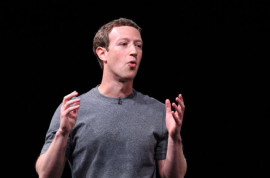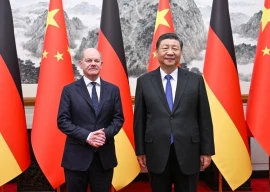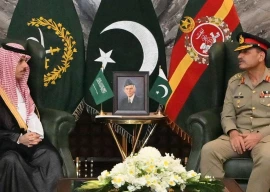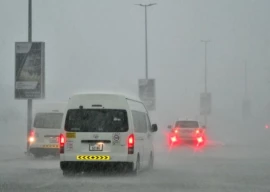
CHICAGO:
Despite intense pressure and Nato’s public call for reopening supply routes through Pakistan in a summit declaration, President Asif Ali Zardari made no promises in Chicago.
In a short speech on Monday to leaders from countries in the Nato-led force in Afghanistan, President Zardari gave no indication that Islamabad would be reopening vital Nato supply routes anytime soon without the preconditions Pakistan’s Parliament had put in place.
He told the gathering of more than 50 nations that “Pakistan believed in partnerships based on trust and respect. Partnerships that will secure the future of our people.”
The president, however, did address the pressing matter of the reopening of Nato supply routes, saying Islamabad had ordered negotiators to conclude a deal with the United States.
Zardari said the cabinet’s Defence Committee “decided to direct the relevant officials to conclude negotiations for resumption of the Ground Lines of Communication” needed to supply foreign troops in Afghanistan.
In his address, Zardari called the botched air raid “a serious setback” that “required that we review our engagement and cooperation.”
The parliament “has spoken in favour of cooperation and a partnership approach,” he said, adding that Pakistan was bound by the advice of parliament and the democratic forces.
“Our parliament has also recommended that foreign fighters and non-state actors seeking to destabilize Afghanistan and the region, if found on our soil, must be expelled. We are devising a comprehensive plan for this purpose. This would require the support of the international community both in terms of resources and capacity building. It will also require measures aimed at the economic well-being of the people of the areas affected by the military action,” he added.
Afghan reconciliation
The president said Pakistan’s destiny was inter-linked with Afghanistan while expressing support of all efforts for peace and reconciliation in the war-torn country.
“We firmly believe that only an inclusive intra-Afghan dialogue can lead to sustainable peace in Afghanistan,” he said.
US-Pakistan bilateral talks
Earlier, Pakistan and the US ended their Chicago consultations on the side-lines of the Nato summit, “agreeing to disagree” on almost all their mutually contentious issues but seemingly pushed by their respective national interests to continue talking to seek ways to bridge the trust deficit which refuses to disappear.
Even the quick handshake between President Obama and President Zardari before the start of the consultations among participants of the summit this morning appeared to have failed to break the ice. However, unconfirmed reports claim that the two presidents met for short while after the handshake but details of what transpired between the two were not readily available.
Briefing by secretary general
At the end of the final day of the summit, the Nato Secretary General while briefing the media said that it was in Pakistan’s interest to have a stable Afghanistan and voiced optimism that Pakistan would reopen a vital supply route for foreign troops in Afghanistan despite failing to reach a deal at a summit in Chicago.
“We did not anticipate an agreement on the Pakistan transit routes to be reached at this summit. That was not planned,” Secretary General Anders Fogh Rasmussen told reporters.
But he added: “I express some optimism as regards the possibility to see the reopening of transit routes in the very near future.”
The secretary general went on to add that President Asif Ali Zardari was invited “because we wanted to engage with Pakistan. We need to have a positive engagement with Pakistan. I met President Zardari, I was encouraged by his statements.”
NATO declaration
The Western alliance agreed to hand control of Afghanistan over to its own security forces by the middle of next year, putting the Western alliance on an ‘irreversible’ path out of an unpopular, decade-long war.
In a declaration at a summit in Chicago, the alliance expressed appreciation to Russia and Central Asian governments for allowing supply convoys through their territory in what seemed to be a cautionary statement directed towards Pakistan and said “Nato continues to work with Pakistan to reopen the ground lines of communication as soon as possible.”
“The countries in the region, particularly Pakistan, have important roles in ensuring enduring peace, stability and security in Afghanistan and in facilitating the completion of the transition process,” the declaration said.
Pressure on Pakistan
The seemingly intense pressure being put on Pakistan was reflected in the Monday edition of The Wall Street Journal, which said that US tensions with Pakistan complicated the opening day of the Nato summit as the US had failed so far to reach a deal with Pakistan to reopen key supply routes into Afghanistan.
“Zardari was invited to attend the two-day summit at the last minute in hopes that would lead to a deal, but the two sides remain at odds over how much the US and its allies should pay Pakistan per container,” it further said.
It seems the bottom line was dollars at the summit for both the Western alliance and Pakistan as the former is seeking substantial contributions from its recession-battered members, amounting a total of $4.1 billion, to finance its withdrawal and support the peace aftermath, while the latter is suffering from one of its worst economic squeezes in history and is looking forward to cashing in on the Afghan withdrawal concerns by proposing that the transit fees per container be raised to as much as $5,000 from the current $250, a demand that Washington and its allies have rejected as excessive.
The refusal of President Obama to have an official one-on-meeting with President Zardari is being used as pressure meant to make the latter “feel uncomfortable,” the WSJ said, quoting an unnamed senior US official.
The Chicago Tribune on Monday said that the two-day summit, the largest in the military alliance’s 63 year history, came as White House officials made clear they were furious at Pakistan’s continued refusal to reopen ground routes used to move fuel and other war supplies into Afghanistan, a six month standoff the White House had hoped to resolve before the summit.
Pakistan’s version
Pakistanis on their part led by President Zardari appeared to be putting up a brave face in the face of intense pressure as they publicly stuck to their stand that both a US apology and cessation of drone strikes were not off the table as far as they were concerned and that they would not settle for anything less than what they are demanding as a transit supply fee.
The unflappable presidential spokesperson Farhatullah Babar and a media savvy Ambassador Sherry Rehman effortlessly kept their cool while fielding some very searching questions from a group of Pakistani media representatives at their late evening briefing on President Zardari’s engagements.
Their brave faces indicated that either Pakistan had not realised the gravity of the situation or they had come prepared not to sign on the dotted lines, come what may, and therefore were ready face the consequences.
Or perhaps both US and Pakistan are deliberately sending well orchestrated signals for the benefit of their respective parties while having already reached some kind of accord on major issues to be made public at a mutually agreed time. As both the Democrats in the US and the Pakistan Peoples Party (PPP) enter election mode, they may be seeking to extract the maximum political advantage– or minimum political damage – from this deal.
Babar said the two sides while agreeing to disagree on their contentious issues sought to continue talks to bridge the trust deficit, which he thought was a positive aspect of the meeting between Zardari and Clinton.
“We searched for convergences and tried to reduce the points of divergences. We dispelled the misperception regarding the alleged links with Pakistani militants … The Secretary of state was informed that the US has not paid a single penny under CSF head since July 2010. President Zardari reiterated that Pakistan needed trade rather than aid, stoppage of drone attacks, and would like speedy implementation of reconstruction opportunity zones.”
US president’s speech
Meanwhile, in his opening remarks on the final day of the summit the US President welcomed Nato allies and partners that make up the International Security Assistance Force (Isaf) in Afghanistan and particularly mentioned the presence of Afghan President Karzai, as well as officials from central Asia and Russia: “nations that have an important perspective and that continue to provide critical transit for Isaf supplies.” He did not name Pakistan even once in his speech.
US President Barack Obama and his 27 military allies also ordered military officers to begin planning a post-2014 mission to focus on training, advising and assisting Afghan troops and special forces.
“As Afghans stand up, they will not stand alone,” Obama said.
Meanwhile, in a sign of growing impatience within the alliance, new French President Francois Hollande refused to back down from his decision to pull troops out in 2012, a year earlier than planned.
(Read: Chicago hiccups)
Published in The Express Tribune, May 22nd, 2012.
COMMENTS (40)
Comments are moderated and generally will be posted if they are on-topic and not abusive.
For more information, please see our Comments FAQ






















1701091268-0/Elon-Musk-(3)1701091268-0-270x192.webp)






















Lets be fair. With no signs of apology and outright rejection of any halt in drone attacks, enhanced transit fee (not so high if you consider the merchandise value and damage to infrastructure and lending ammunition / justification to Jehadi elements to target Pak forces), transit fee is the only fig leaf for face saving. If USA opts to be obstinate as per Super Power prerogative, what can we do except suffer the consequences in an honorable manner. Please note that I do not belong to Ghairat Brigade and just trying to be sensible.
@Naeem Khan Manhattan,Ks:
Not only would I not bet against Obama's reelection, I'm certain a Romney presidency would be much, much worse for Pakistan.
The "Ghairatmands" must be ecstatic that US Pakistan relations are destroyed and now we are firmly in the Taliban camp.
If the US economy stays the way it is, Mr. Obama will be history. He has promised the liberal side of Democratic Party and failed to deliver, they are already disgruntled and will not vote for him or contribute financially , I will not either. I still don't comprehend why was he awarded the Noble Peace Prize for what, it turned out that he has killed more Innocent Pakistanis in FATA than that cowboy from Texas Bush did. Hurray for the Noble Peace Prize. If US wages wars around the world then they should pay for it, $5000 per container is a fair fee because 300-400 heavy laden trucks traveling from Karachi to Peshawar daily do damage the roads and create pollution, danger and nuisance for the communities
We must appriciate President and his team to stand firm and representing Pakistan respetfully
Afghanistan: Graveyard of Empires Pakistan: Graveyard of Containers ++++++++++++++++++++++++
Zardari wants that all non state actors( except those of pakistan) be expelled from the region). ofcourse the pakistani non state actors are strategic assets, and cant be expelled. They are needed in instigating terror in afganistan, india,iran, china.
Guys!! Give him a break. Americans invited him so that they can publically humiliate him. He is our president, regardless his faults, he should not have been treated like this. Period.
@Tony Singh: You are right Tony, we in Pakistan are in the habit of criticizing just for the sake of criticizing.
The president said Pakistan’s destiny was inter-linked with Afghanistan ..........We firmly believe that only an inclusive intra-Afghan dialogue can lead to sustainable peace in Afghanistan,” he said.
Sir, on this pretext any country can interfere in another country. Think if India says our so we must have there a Govt of our choice. How would that be correct? Surely it will be wrong.
I think the Pakistanis should show their president a little more respect. He has stood his ground. One can debate whether the decision of Pakistan is right or wrong, but their President has not compromised on the will of Pakistani people,
I appreciate the firm stance by Mr. President Asif ali Zardari.. Atleast he is not a hypocrite. Well Done Mr. President.
"The unflappable presidential spokesperson Farhatullah Babar and a media savvy Ambassador Sherry Rehman effortlessly kept their cool while fielding some very searching questions from a group of Pakistani media representatives at their late evening briefing on President Zardari’s engagements."
Let's try to keep our reporting objective and avoid putting in biased and pointless adjectives in our reporting. it seems Mr. Ziauddin does not know how to report news, and is trying to force his unwanted opinion on to the readers.
@the Skunk:
"Out of nothing, comes nothing. What have we gained in this partnership of sixty-five years? "
In the past 65 years, Pakistan got over $200B in today's dollars (net present value) from the US as free doleouts.
US should have struck a deal with Kayani directly since the civilian govt is powerless who takes orders from the military regarding all important issues whether big or small.
@American Desi: Allah Almighty has deprived some souls the tendency of positivity. Any step in the right direction, regardless of who ever takes it, should be apprecieted. And vice-versa. The voice raised by Zardari represents not only the Stars and Crowns, but the parliament, including opposion and the whole nation - less the Mullahs.
The title sentence is not complete: "Chicago declaration: In the face of pressure, Pakistan offers no quarter, and gets not one quarter": see.....
' transit fees per container be raised to as much as $5,000 from the current $250'. I think that this amount is fair but with an added clause: Pakistan will pay US$ 1million for each container lost/stolen/burnt as reimbursement. Over 20,000 containers have vanished over the years.
I can understand the frustration of US/ NATO where Pakistan is showing some guts this time.
@Its (still) Econonmy Stupid: @American Desi: Let us for a while think positive,presently the stand and pressure this leadership sustaining is purely as per the people desire.I am not fond of Zardari but he is proofing to be good in the national interest..
*thanx president
As far as this summit is concerned...Zardari Perfroms well!!
All Pakistanis should expect increase in terrorism after this meeting. Be careful where you go in public.
Zardari says Pakistan believed in trust and respect?
Respect: His own PM is convicted by Supreme Court, would anyone in the world respect a nation that is lead by a convict, headed by a corrupt to core president?
Trust? Would any nation in the world trust an army that played a double game for 10 years post 2001, after promising to turn the corner? Hosted Osama bin laden, while pretending to search for him?!!
This is in contrast to what the electronic media was discussing last night. As per ET's article Pakistan stood firm and stuck to its stance or may be I misunderstood it.
The question is that if Pakistan’s role is so crucial in the Afghanistan’s future and Pakistan wields enormous influence over that major players of the entire game, Taliban, then why American president has chosen to humiliate the entire Pakistani nation by refusing to meet its president and offering a formal apology over Salala demanded by Pakistani president. Is it possible that Americans have been able to reach out to the Taliban without Pakistan’s help and now want to abandon the “bad boy” like they did in 1989. If that be the case, then the endgame is nowhere in sight. If the GLOC is so crucial to NATO, then why Pakistan is being denied its fair price? Is it a fact that the world has stopped taking Pakistani leaders seriously? Read more at: http://passivevoices.wordpress.com/2012/05/21/chicago-summit-can-pakistan-be-a-real-spoiler-of-the-end-game/
How eagerly two puppets looking at his master
The line bwetween Stupidity & Wisdom is a thin one +++++++++++++++++++++++++++++++++++++++++
The gall.
US has come too far to squander the opportunity to force Pakistan to acquiesce. Few more days of withholding aid and we'll see the reality.
Pakistan had agreed to reopen routes to get an invite to Chicago, it will agree for a lower price for some other reason. Just give it time.
In spite of the pressure brought upon Pakistan by all and sundry, President Zardari and his team stood their ground and came out stronger than when they first arrived. NATO and the US are used to pushing Pakistan to the Wall, especially when so called Commando Generals are in power. Can you imagine Musharraf standing up to such pressure, or for that matter Zardari or Kham sahib?? They can't even utter a word these days. Pakistan is in the right and I remember US claiming that they did not need routes via Pakistan. Then why all this hue and cry??? Let them use the routes via countries they have praised at the Conference. Pakistan has given these routes for free for 11 years and what good has that done. Be like India, which in the UN Security Council has rarely ever voted with the US and yet US bows for their friendship in the belief that they can make India stand up to China. What crass logic??? India will fight for its national interests, not because US wants it to.
Kudos to the elected govt for not going against the parliament. They should not make any decision in this regard and let the ISPR and general deal with the ground realities as the president put it. The US aid ($24 billions) has not been used for public during the long era of Gen Mush and it is not going to change. So let the generals, who made a big deal with Kerry-Lugar Bill and Salala, deal with the NATO. You broke it, you fix it! Learn from HH experience.
thanks president...
The ball game with USA is hopefully over. In all the years of our independence, there have been very few instances when the country has stood its ground. Yes, stood its ground. Mr. Obama should have treated Mr. Zardari with respect and acknowledgement, but the mighty hubris overcame hospitality and courtesy.
Out of nothing, comes nothing. What have we gained in this partnership of sixty-five years? Frankly, to speak the truth, very little. Now it is time to re-arrange and re-prioritize our day-to-day operations and give the meaning of independence a new definition. If we are to survive as a nation. This is an ideal time for Mr. Zardari, the armed forces and the citizens to give a new meaning to our economy.
Salams to Pakistan
Spin it anyway you want, it was still a smackdown delivered by Obama in Chicago.
President Zardari did what Pakistani media was suggesting, but still he will face hard questions once he is back home.
Pakistan must offer no quarter since it has none to spare.
If NATO decides to transfer all the back logged containers, save the critical ones, to AFG what is PAK planning to do. Will she block the container movements to AFG by violating international law?
By the end of fall if there is no clear signs of improvement in NATO supply route fiasco, US-PAK relationship is done for good.
PAK side should realize that when US decided to "visit" PAK on May 2, contingency plans on the NATO supply route closing was already discussed and decided on the US side.
So what exactly did the Pakistani delegation accomplish in Chicago? Nothing but reminding the world that Pakistan is a rogue state upon which no one can defend. Good job Mr. Zardari for tarnishing the already awful image of Pakistan further.
"Despite intense pressure and Nato’s public call for reopening supply routes through Pakistan in a summit declaration, President Asif Ali Zardari made no promises in Chicago." Yawn--- It is for local consumption.
Zardari can only speak what has been approved by the establishment nothing more. Probably he did not have any permission.